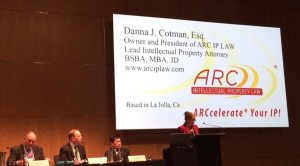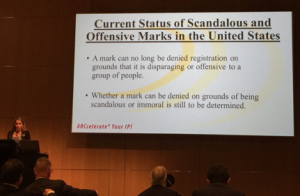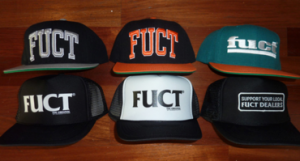Current Status of Scandalous and Offensive Marks in the United States

On November 5th, 2017, founder and lead Intellectual Property Attorney of ARC IP Law, Danna Cotman, traveled to New Zealand where she had the honor of moderating a trademark panel at the 2017 Asian Patent Attorneys Association in Auckland. The topic of the panel was “No Offense Meant: The Registration of Scandalous and Offensive Marks.”
Along with moderating Mrs. Cotman had the pleasure of presenting a brief overview of the current law regarding scandalous and offensive marks in the United States. The following summarizes Mrs. Cotman’s update on scandalous and offensive marks in the United States.

United States Scandalous and Offensive Trademark Update
Originally, section 2(a) of the Lanham Act, 15 U.S.C. §1052(a), provided an absolute bar to the registration of scandalous matter which may disparage on persons, institutions, beliefs, or national symbols.1 For most of the 20th century the United States Patent and Trademark Office had a very subjective approach to what constituted a “Scandalous,” “Offensive,” or “Disparaging” mark and provided little if any clarifying guidelines of what was considered disparaging. During the congressional hearings on the Lanham Act in 193
9, the Assistant Commissioner of Patents testified that “it is always going to be just a matter of the personal opinion of the individual parties as to whether they think it is disparaging.”2

The USPTO has historically demonstrated inconsistency with its grants and denials over the years, providing the public with little to no guidance of what may be allowed. For example, the mark HAVE YOU HEARD SATAN IS A REPUBLICAN was denied by the USPTO in 2010, because it was disparaging, and yet the mark THE DEVIL IS A DEMOCRAT was allowed in 2012.


Further, the mark COCAINE for carbonated and noncarbonated soft drinks and energy drinks was denied, because the mark was scandalous for the applied-for goods since it would be marketed to “virtually all consumers,”including children. However, the USPTO allowed other drug related marks forenergy drinks such as EXTASY, BLACK OPIUM, METH, BONG WATER, and KRONIK.
 Other examples of marks that the USPTO denied registration to because they were scandalous, offensive, or disparaging include: ASSHOLE REPELLENT (for fake spray can gag gift), NO $#!+ (for entertainment services), AUDIOTURD (word and image for digital media), BUBB Y TRAP (for bras), and MADONNA (for wine).
Other examples of marks that the USPTO denied registration to because they were scandalous, offensive, or disparaging include: ASSHOLE REPELLENT (for fake spray can gag gift), NO $#!+ (for entertainment services), AUDIOTURD (word and image for digital media), BUBB Y TRAP (for bras), and MADONNA (for wine).
 Yet, the following mark were granted: BIG F’N GARAGE (for online community for musicians), BADASS (for musical instruments), MOONIES (word and image for dolls), LIBIDO (for perfumes), TWATTY GIRL (for cartoon strips), and BIG COCK COUNTRY (for ball caps).
Yet, the following mark were granted: BIG F’N GARAGE (for online community for musicians), BADASS (for musical instruments), MOONIES (word and image for dolls), LIBIDO (for perfumes), TWATTY GIRL (for cartoon strips), and BIG COCK COUNTRY (for ball caps).
A lack of consistency regarding scandalous and offensive marks has constantly haunted the USPTO over the last several decades. However, the recent U.S. Supreme Court decision of Matal v. Tam may have solved the problem of offensive marks, and once the Federal Circuit makes a decision on In Re Brunetti, hopefully the issue of scandalous and immoral marks will also be put to rest.
 In Matal v. Tam, an all-Asian American band named “The Slants” attempted to registered its name with the Trademark Office, but was denied because the examiner found the mark to be disparaging a substantial composite of persons of Asian descent. The case made its way all the way to the U.S. Supreme Court where, on June 19th of this year, in a highly anticipated outcome, the Court unanimously held that the provisions of the Lanham Act prohibiting the registration of marks that disparage persons, institutions, beliefs, or national symbols violated the First Amendment.
In Matal v. Tam, an all-Asian American band named “The Slants” attempted to registered its name with the Trademark Office, but was denied because the examiner found the mark to be disparaging a substantial composite of persons of Asian descent. The case made its way all the way to the U.S. Supreme Court where, on June 19th of this year, in a highly anticipated outcome, the Court unanimously held that the provisions of the Lanham Act prohibiting the registration of marks that disparage persons, institutions, beliefs, or national symbols violated the First Amendment.
A main issue the Supreme Court resolved was whether trademarks were government speech as opposed to private speech. Because of the limited control the USPTO has over a mark, the Supreme Court found that the content of a registered mark was not government speech and as such may not deny a benefit to a person on a basis that infringes his constitutionally protected freedom of speech.3
In his decision Justice Alito, quoting Justice Holmes from 1929, stated “Speech that demeans on the basis of race, ethnicity, gender, religion, age, disability, or any other similar ground is hateful; but the proudest boast of our free speech jurisprudence is that we protect the freedom to express “the thought that we hate.”

The decision of this case will have a huge effect on the United States trademark industry, since so many marks that were originally denied for being disparaging can now refile and hopefully gain registration. However, it is important to realize that the decision only ruled the disparaging portion of the Lanham Act as unconstitutional and marks that are found to be immoral, scandalous, or falsely suggesting a connection with persons, institutions, beliefs, or national symbols could still be denied registration.
As a result of the Supreme Court’s holding in Matal v. Tam, the Trademark Manual of Examining Procedures was amended changing 15 U.S.C. §1052 removing any disparaging limitations to read as follows:
15 U.S.C. §1052 (Extract)
No trademark by which the goods of the applicant may be distinguished from the goods of others shall be refused registration on the principal register on account of its nature unless it–
(a) Consists of or comprises immoral, deceptive, or scandalous matter; or
matter which may disparage or falsely suggest a connection with persons,
living or dead, institutions, beliefs, or national symbols, or bring them into
contempt, or disrepute; or a geographical indication which, when used on or
in connection with wines or spirits, identifies a place other than the origin of
the goods and is first used on or in connection with wines or spirits by the
applicant on or after one year after the date on which the WTO Agreement (as
defined in section 2(9) of the Uruguay Round Agreements Act) enters into
force with respect to the United States.
 In In Re Brunetti, the USPTO denied registration of the mark FUCT for apparel, because it was scandalous and immoral in nature. However, this case was stayed pending the Matal v. Tam decision. Now that the Supreme Court has made a decision on Matal v. Tam the Federal Circuit has ordered the parties to submit briefs explaining how the Matal v. Tam decision affects the scandalous and immoral provision of the Lanham Act.
In In Re Brunetti, the USPTO denied registration of the mark FUCT for apparel, because it was scandalous and immoral in nature. However, this case was stayed pending the Matal v. Tam decision. Now that the Supreme Court has made a decision on Matal v. Tam the Federal Circuit has ordered the parties to submit briefs explaining how the Matal v. Tam decision affects the scandalous and immoral provision of the Lanham Act.
Based Matal v. Tam, many believe this decision will carry over to the scandalous and immoral portion of the Act, since trademarks are private speech and the government’s role with trademarks is simply to determine whether the applied-for mark meets the requirements for federal registration.4 However, until the Federal Circuit reaches a decision in In Re Brunetti it is unknown whether the scandalous and immoral provisions of the Lanham Act will have the same fate as the disparaging provision, but it is likely it will.

Another effect of the Matal v. Tam case is that the long-time controversy over the registration of the Washington Redskins will finally be concluded. In 2014, the Federal Trademark and Appeal Board voted to strip the National Football League’s team of its trademarks and consequently it’s nickname, which it has had since 1933, because they weredisparaging. The team appealed the Federal District decision to support the Appeal Boards cancelation of the marks, but the case was stayed pending the outcome of Matal v. Tam. Now that the disparaging provision of the Lanham Act has been found unconstitutional, it will be interesting to see whether the Washington Redskins are successful in their appeal.
In concluding her presentation, Mrs. Cotman noted that the current status of the trademark industry in the United States is that marks will no longer be denied registration on grounds that they are disparaging, but whether they can be denied registration on grounds of being scandalous or immoral is yet to be determined.
You can see the presentation here.
ARC IP Law is well versed in all areas of trademark law including both domestic and international trademark law.
Hollie Kucera is a first year associate at ARC IP Law with a background in Electrical Engineering and holds a certificate of specialization in Intellectual Property.

